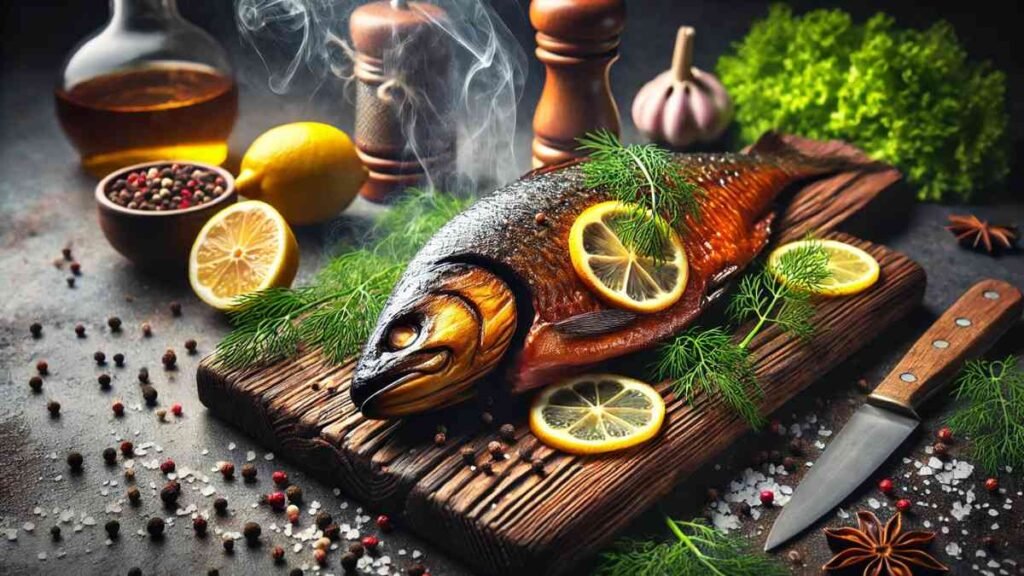Introduction
Smoking fish is an art that relies heavily on the preparation stage, and the key to moist, flavorful results is a well-made smoked fish brine. This article dives into the science, technique, and benefits of brining, ensuring your smoked fish and even chicken dishes achieve a professional-quality taste. Along the way, you’ll also learn about chicken wing brine and other effective techniques.
What is Brining and Why is It Important?
Brining involves soaking food in a solution of water, salt, and other ingredients, often combined with sugar and spices for enhanced flavor. For fish, this method not only locks in moisture but also creates a firmer texture, making it perfect for smoking. It ensures the flesh doesn’t dry out, even during extended cooking. When applied to chicken, brining elevates the taste by infusing it with seasoning while improving tenderness, resulting in juicier and more flavorful dishes every time.
How to Make the Perfect Smoked Fish Brine
Ingredients for a Basic Brine
- 1 gallon (3.8 liters) of water
- 1 cup kosher salt
- ½ cup brown sugar
- 1 tablespoon black peppercorns
- 2 bay leaves
Steps to Prepare the Brine
- Dissolve Ingredients: In a large pot, heat the water and dissolve the salt and sugar completely.
- Add Aromatics: Stir in the peppercorns and bay leaves for enhanced flavor.
- Cool the Brine: Let the mixture cool to room temperature before use.
Brining the Fish
- Submerge the fish completely in the cooled brine.
- Refrigerate for 6–8 hours (depending on the thickness of the fish).
- After brining, rinse the fish under cold water and pat it dry.
Pro Tip: Allow the fish to air-dry until a pellicle (tacky surface) forms before smoking. This ensures the smoke adheres well.
Adding Variety to Your Smoked Fish Brine
While the basic brine recipe works wonders, here are some creative ways to elevate your smoked fish:
- Citrus Brine: Add orange or lemon zest for a zesty kick.
- Herbal Brine: Include fresh herbs like dill or parsley.
- Spicy Brine: Toss in red pepper flakes or chili powder for some heat.
Chicken Wing Brine for Smoky Perfection
Brining chicken wings before smoking or grilling enhances their flavor and tenderness. Follow these steps:
- Mix 4 cups of water with ¼ cup of kosher salt and 2 tablespoons of sugar.
- Add garlic cloves, peppercorns, and a splash of hot sauce for flavor.
- Brine the wings for 4–6 hours.
- Rinse and pat dry before seasoning and cooking.
This process ensures crispy skin and juicy meat.
Tips for Brining Success
- Measure Salt Correctly: Too much salt can overpower the dish, so stick to precise measurements.
- Use Cold Brine: Ensure the brine is cooled to avoid partially cooking the food.
- Do Not Over-Brine: Over-brining can result in overly salty food.
Common Mistakes to Avoid
- Skipping the rinse: Always rinse brined fish or chicken to avoid an overly salty taste.
- Inadequate brining time: Less time in the brine leads to uneven seasoning.
- Using a reactive container: Always use non-reactive materials like glass or stainless steel.
Conclusion
A smoked fish brine is your ticket to creating mouthwatering smoked fish that’s juicy, flavorful, and perfectly seasoned. Whether you’re preparing a classic smoked salmon or mastering a chicken wing brine, these techniques ensure your dishes stand out. Elevate your smoking game by incorporating brining into your routine—you won’t be disappointed!
FAQs About Smoked Fish Brine
1. Can I reuse smoked fish brine for another batch of fish?
No, it’s not recommended to reuse brine as it can become contaminated with bacteria from the first batch of fish. Always prepare a fresh brine for each use to ensure food safety and optimal flavor.
2. What type of fish is best suited for brining and smoking?
Oily fish like salmon, trout, mackerel, and tuna are ideal for brining and smoking as they absorb flavors well and retain moisture during the smoking process.
3. How long should I brine fish before smoking?
The brining time depends on the thickness of the fish. Generally, 6–8 hours is sufficient for most cuts. For thinner fillets, reduce the brining time to 2–4 hours to avoid over-salting.
Let me know if you need more tailored FAQs!
For More Visit, MirrorMagazine.co.uk


